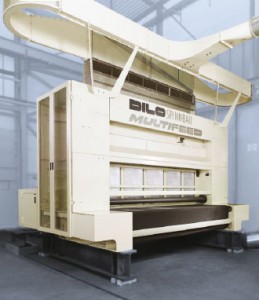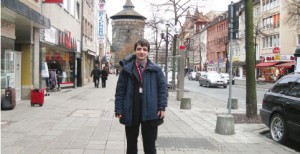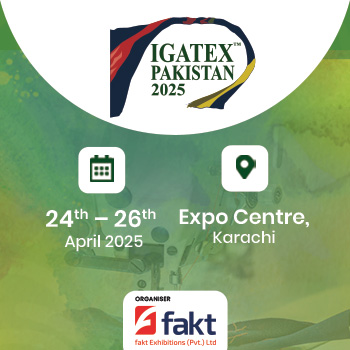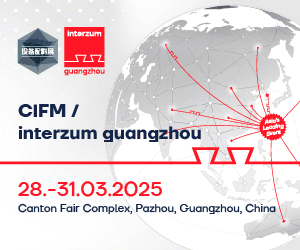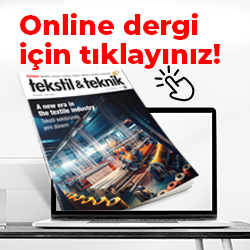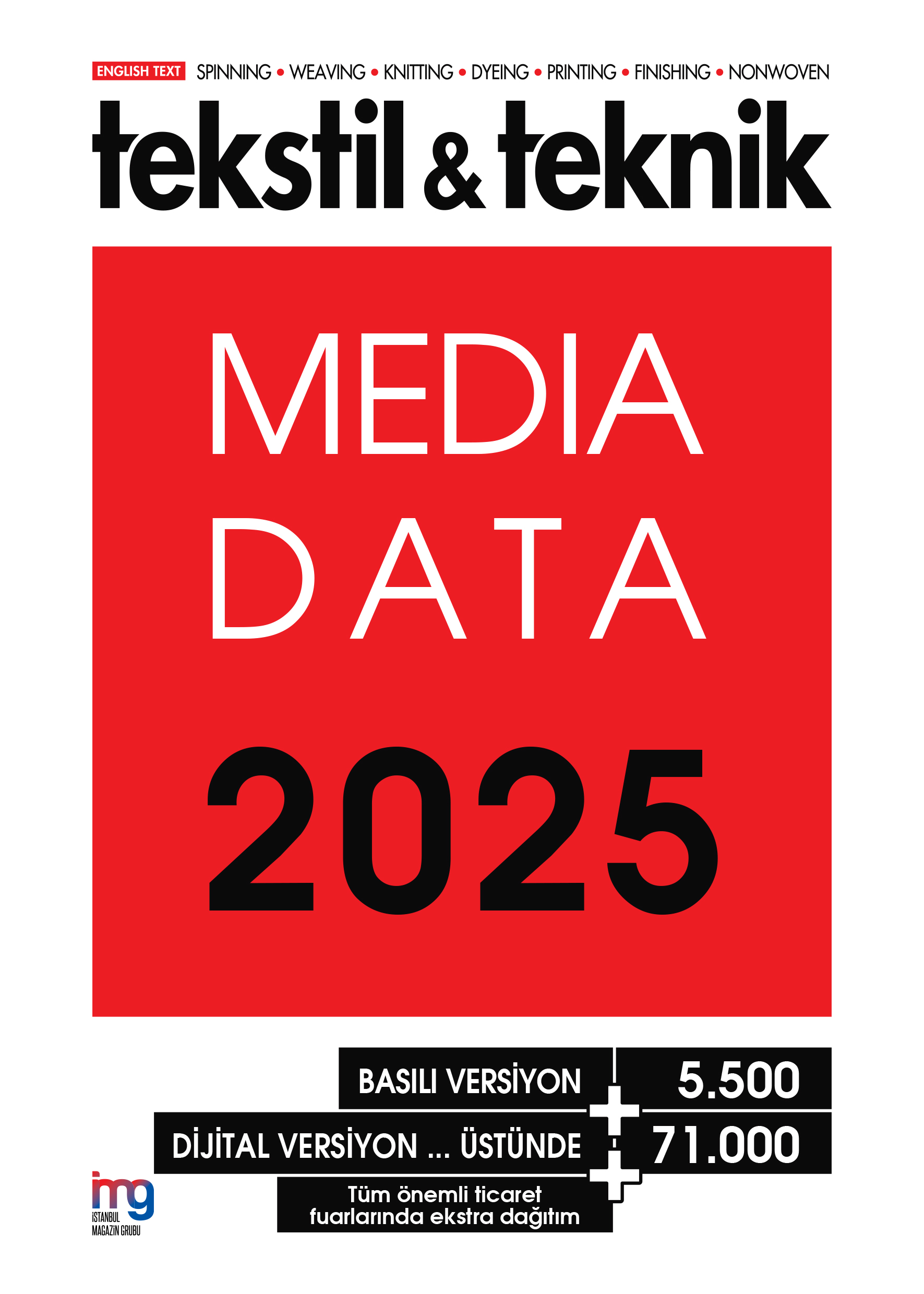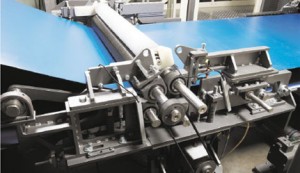 In accordance with the increasing costs for energy and raw materials, all the textile-manufacturing chains pursue for energy and raw material saving possibilities.
In accordance with the increasing costs for energy and raw materials, all the textile-manufacturing chains pursue for energy and raw material saving possibilities.
So do the nonwoven manufacturers. As the premier builder and supplier of complete “made in Germany” nonwoven lines specifically engineered to customer needs “made in Germany” for staple fibre nonwoven production, Dilo Group concentrated on developing new equipment to improve operation efficiency, web quality and uniformity, with positive effects on all staple fibre bonding processes. All these elements forming the part of “Dilo-Isomation Process” aim at an even mass for reduced fibre production. On the other hand since Dilo’s processes are mostly mechanical during the web formation and web consolidation, Dilo has also been active in an area where the energy requirement for 1 kg of production is low compared to non-mechanical processes. Headquartered at Eberbach, this family owned international specialist company in the field of opening, blending, carding, crosslapping and needling technologies has continuously been contributing to progress in the nonwovens industry. In close cooperation with leading partner companies, Dilo not only offers complete installations for needling, which today is the most important bonding technology with a worldwide growth rate of approx. 6 %, but also for other consolidation technologies such as thermobonding, water-entangling or chemical impregnation. Dilo expects a further growth with a great potential for their highly innovative state-of-theart production lines, since all types of fibre – manmade, organic, natural, inorganic and even metallic fibre – may be processed on their lines for universal applications. Based on the evaluation of their throughput rate, web quality, production efficiency, ease of operation and service quality, as well as a lot of innovations and inventions that they have contributed to the industry Dilo has built a perfect reputation in the nonwovens field. Today, Dilo has become the largest supplier for staple fibre nonwoven needling lines with regard to sales volume and number of employees. Mr. Johann Phillip Dilo, CEO, Dilo Group, granted us an exclusive, impressive and enlightening interview on Dilo’s sustainability aspects, adaptability of sustainability to nonwovens field, future of sustainable nonwovens, growth of the nonwoven market in the world and in Turkey and the trends in nonwoven production. Born on July 22, 1953, in Eberbach, Mr. Johann Phillip Dilo has completed Dipl.-Ing in Mechanical Engineering at Teschnische Hochschule in Darmstadt. Along with his top management position in Dilo Group, Mr. Dilo held the Presidency of Textile Machinery Association of VDMA between 2005 and 2008 and also was a member of CEMATEX board during the same period.
Today’s definition of sustainability involves permanently sustainable development in both the economic and the ecological and social realms. How would you define sustainability in nonwovens?
“The term sustainability was historically related only to the forestry. In tree plantations only that much was harvested as was regrown naturally. Today there is a deviation from that original meaning in that it would also include the meanings for processes with the usage of natural biological resources instead of industrially explored resources which would in addition be recyclable and/or biodegradable, in short: environmentally compatible or ecological.”
How does Dilo view its obligation to the environment?
“Dilo’s focus to meet environmental requirements is twofold. First of all the provision of machinery of our program for the processing of natural fibre or biodegradable fibre, the recyclability of textile products and fibres as well as the processability of fibres made from bioplastics is one aspect and the other is to provide machinery with a low consumption of energy. Since our processes are mostly mechanical during the web formation and web consolidation, we are per se active in an area where the energy requirement for 1 kg of production is low compared to non-mechanical processes.”
Can you brief us the economic advantages of the Dilo products? In which period the manufacturers can amortize these investment costs?
“This question can only be answered in general broader terms. Yet the basis for an economic advantage is a high production rate based on fibre throughput per hour, efficiency and availability of the machinery as a whole in a complete line. This is generally the case with our technologies. We provide high throughput rates and efficiency. A next most important point is the amount of fibre used to achieve certain quality characteristics like homogeneity, strength, abrasion resistance and so forth. This is provided by our strides to make the product more even with regard to the fibre distribution across the material’s plain. We have pro vided many achievements under the general topic of “Isomation” to offer more evenness in the nonwoven product in order to reduce the fibre consumption. The amortization period for the invested capital is relatively short using such economic advantages which are continuously developed further. The other side is of course the individual price situation for such products on the nonwovens market that may differ considerably among various segments.”
How does Dilo foresee the future of sustainable nonwovens?
“Our whole industrialized world including the agrarian sector today pursues attempts to be more ecological, environmentally safe and to provide savings for raw material and energy. This is today true for almost any industrial sector in the Western hemisphere and of course includes the nonwoven industry. We see in that general trend an extremely valuable direction of the industry that is a must to survive on this planet. Therefore it is anticipated that for sustainable nonwovens and processes there will be a bright future.”
What are your experiences in the adaptability of sustainability to the nonwovens industry?
“Along with my more personal definition above of the term “sustainability” we see particularly in the needle punching industry an excellent sound and long-term basis for an ecologically viable industrial process. As already indicated before any fibres may be processed but in this context of course the priority is laid on natural fibres, recyclable fibres, degradable fibres, and bio-based polymers.”
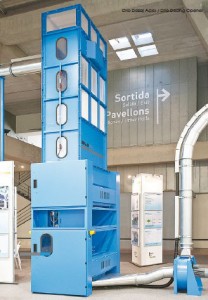 Can you summarize the recent developments of Dilo and are there any innovations that you foresee for the upcoming period?
Can you summarize the recent developments of Dilo and are there any innovations that you foresee for the upcoming period?
“Our machine developments for fibre preparation, carding, crosslapping and needling are in a leading position worldwide. It is important that also our organization with subsidiaries worldwide in Istanbul, Shanghai, Moscow and Charlotte including our network of agents will provide improved closeness to our customer base and further improved service.”
How do you evaluate the growth of the nonwoven industry in the world and in Turkey?
“For this question I can only rely on general statistical data, which is available through the various industrial associations that we have a steady growth for needled nonwovens in an area of approx. 6 % per year as an average worldwide. The largest sector for the production of nonwovens staple fibre products is needle punching.”
What are the current trends that you observe in the manufacturing of nonwovens & technical textiles?
“A current trend in the manufacturing of nonwovens and technical textiles is the increasing volume of new fibre material for which the machinery components have to be adapted in order to optimize the processing of the individual new fibre. This includes of course carbon fibre as well. This and the general trend for more highly specialized applications, partly with smaller volume, can be observed.”
How significant are the energy and raw material costs in terms of machine selection & processing routes?
“As mentioned earlier the energy and raw material costs are playing the most important role in textile manufacturing and therefore there is a trend to select machinery and technology along this line of energy and raw material efficiency. Consequently, the achievements of our research and development departments incorporated in our range of products will gain further attractiveness.”
 What are your final remarks to the World markets regarding on sustainable innovation and production?
What are your final remarks to the World markets regarding on sustainable innovation and production?
“It is important that ecological achievements and sustainability are adopted in all societies worldwide as soon as possible.”

